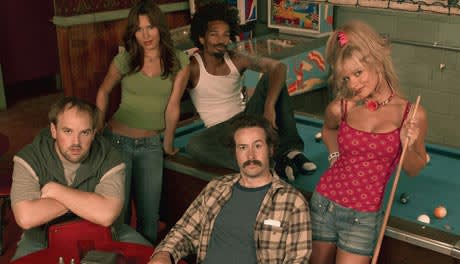Considering its subject matter, My Name Is Earl was a surprising hit when it appeared in the fall of 2005. It told the tale of Earl Hickey, a petty criminal who lost a winning lottery ticket after being hit by a car. While lying in his hospital bed, he hears about karma thanks to an episode of Last Call with Carson Daly and decides to reform. When that leads to good things happening, like his missing lottery ticket reappearing, he decides to make doing good his mission and comes up with a list of wrongs hes perpetrated that need to be righted. And thats what every episode in the first season featured Earl taking care of an item from his list and it was very funny indeed. The show took a slight detour in the second season, with plot elements that arced throughout all 23 episodes. Whether or not that was a successful decision or not is open to debate but it did add freshness to what was in danger of becoming a formulaic show. It also set up the third season, which has promised to take the show in yet another direction. Fortunately the combination of excellent writing and an even more excellent cast has meant that My Name Is Earl continues to be one of the most consistently entertaining comedies on TV. One area where the show excels is with the use of guest stars, creating the perfect characters for them to portray that absolutely fit with the overall feel of the show. So, Roseanne Barr becomes a former trailer park resident who became a nun because Earl convinced her that she heard God talking to her. And Burt Reynolds and Norm MacDonald are a father and son duo who own a strip club. Amy Sedaris? Shes a crazy cat lady. And Christian Slater is a loveable stoner. It all makes sense in this wonderfully immense world that Earl inhabits; it is probably one of the most convincing on any television show, in that the entire redneck world is lovingly created rather than ridiculed these are characters, not caricatures. The lines between reality and fiction are wonderfully blurred on the episode "Our Cops Is On, where the main characters are sitting in their local bar when the episode of Cops featuring them plays on TV. As they reminisce about their brush with fame, more back-story about the characters is revealed, something that happens during the entire season, and they revel in their white trash lifestyle. The entire cast is so convincing that its hard to imagine any of them in any other role, even after just two seasons, something that implies that they should all be very leery of typecasting from this point on. Eight of the 23 episodes have commentary tracks featuring cast, crew and all kinds of other people who must have just been sitting around waiting to be asked to be part of a commentary track. The main extra feature is "The Stoner Files, a documentary about making an episode that featured some Claymation segments, although it looks at all aspects of behind the scenes and runs at just over half an hour. The deleted scenes are a little on the disappointing side, as its easy to see why they were left out but the blooper real, on the other hand, is very funny. The special features are rounded out with some short video diaries and an amusing re-imagining of the show as a telenovela.
(Fox)My Name Is Earl Season Two

BY Michael EdwardsPublished Nov 7, 2007